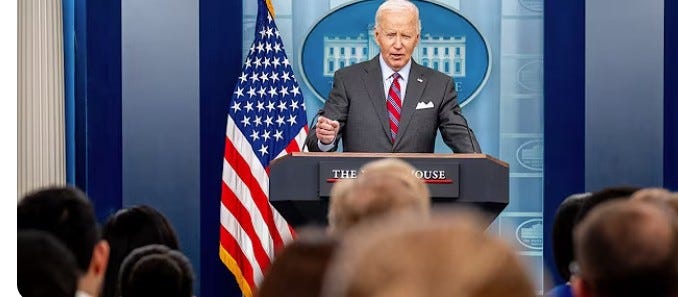In a prolix 315-page report reflecting a 13-month investigation, in which he found President Joe Biden committed no crime in his handling of classified documents as vice president and senator, Special Counsel Robert Hur infamously and gratuitously stated that “Mr. Biden would likely present himself to a jury, as he did during our interview of him, as a sympathetic, well-meaning, elderly man with a poor memory.”
Legal experts and the thoughtful media rightly said that Hur, a Republican appointed to investigate Biden’s document management by Attorney General Merrick Garland, had done a “hatchet job,” wandering far from the permissible.
They’re right. The Supreme Court has reminded prosecutors that:
“The United States Attorney is the representative not of an ordinary party to a controversy, but of a sovereignty whose obligation to govern impartially…He may prosecute with earnestness and vigor—indeed, he should do so. But, while he may strike hard blows, he is not at liberty to strike foul ones.”
Biden’s counsel, Robert Bauer, was correct to point out that Hur’s shot violated “Justice Department norms that essentially work to avoid prejudicing the public against people who are not charged with a crime.”
Hur found that “the evidence does not establish Biden’s guilt beyond a reasonable doubt.” That should have been all he wrote. Instead, he posed as a gerontologist. Biden is 81, but there’s no reason statements not recalling certain things were necessarily a function of age. The interview was being conducted soon after the Hamas attack on Israel, which might have distracted him, or the president was cautiously doing what witnesses are often told to do by their attorneys—carefully guard your answers if you’re not sure, lest you court a false statement charge. Trump’s mentor, the infamous Roy Cohn, was fond of telling his clients, “It’s no crime not to remember.”
Hur larded his conclusion that prosecution was “unwarranted” with contradictory and misleading language that “Biden willfully retained and disclosed classified materials after his vice presidency when he was a private citizen.” And he then conceded that was not legally provable. If it’s not provable, let it go.
Of course, the media widely misreported this. As Just Security wisely analyzed the jaundiced coverage: “The press incorrectly and repeatedly blast out that the Hur report found Biden willfully retained classified documents, in other words, that Biden committed a felony; with some in the news media further trumpeting that the Special Counsel decided only as a matter of discretion not to recommend charges.”
Hur’s report concluded that Afghanistan documents were left in Biden’s Delaware garage, suggesting that he made “an innocent mistake, rather than acting willfully—that is, with intent to break the law—as the statute requires.” Hur conceded that the documents “could have been stored, by mistake and without his knowledge, at his Delaware home since he was vice president, as were other classified documents recovered during our investigation.” [Emphasis added]
As long as he was free-associating, Hur at least came to one wise conclusion. He distinguished Biden’s behavior from that of Donald Trump, saying of the former Republican president,
According to the indictment, he not only refused to return the documents for many months, but he also obstructed justice by enlisting others to destroy evidence and then to lie about it. In contrast, Mr. Biden turned in classified documents to the National Archives and the Department of Justice, consented to the search of multiple locations including his homes, sat for a voluntary interview, and in other ways cooperated with the investigation.
J. Michael Luttig, the oft-quoted former federal appellate judge, criticized Hur’s needless reference to Biden’s age and memory, including the president’s saying he did not remember the date of his son Beau’s death. An “abuse of power,” Luttig concluded. Harvard Law School’s Laurence Tribe saw Hur’s report as a “gross abuse, and one the Attorney General should have intervened to correct. “
And, indeed, it was. Hur’s comment was such a flagrant violation of the professional ethics of a federal prosecutor that he should be the subject of a disciplinary proceeding.
Long ago, in April 1940, in a tumultuous year like this one as World War II raged, and an incumbent president faced a serious challenge, the attorney general and later Supreme Court justice Robert H. Jackson addressed a conference of U. S. attorneys. Commenting on the awesome power of the federal prosecutor, he observed that: “The prosecutor has more control over life, liberty, and reputation than any other person in America. His discretion is tremendous. He can have citizens investigated and, if he is that kind of person, he can have this done to the tune of public statements or unveiled intimations.” Robert Hur incontestably is “that kind of person.”
Jackson told the assembled lawyers: “While the prosecutor at his best is one of the most beneficent forces in our society, when he acts from malice or other base motives, he is one of the worst.” Hur is one of the worst.
Summarizing his view of the prosecutor’s role, Jackson told the group that a prosecutor must have the qualities that mark a gentleman: “A sensitiveness to fair play and sportsmanship is perhaps the best protection against the abuse of power, and the citizen’s safety lies in the prosecutor who tempers with human kindness…who serves the law and not factional purposes….”
How deeply Jackson’s words resonate today as we ponder the cheap shot launched by Hur at the president.
This calamitous outcome may also be laid at the feet of Merrick Garland, who must share the blame for the outrageous outcome with Hur. First, the former federal judge whose Supreme Court nomination was blocked by naked political power on the part of Senate Republicans knows partisanship when he sees it, and he also knows a ham-handed attempt to tell the whole story. Former FBI Director Jim Comey was, of course, universally condemned for exonerating Hillary Clinton but trashing her just before the 2016 election. Judge Luttig also saw the Comey analogy as fitting the Hur situation neatly.
Former prosecutor Andrew Weissmann argues that it was right for Garland to appoint a special counsel but wrong to pick a Republican who may have been subject to political pressure. Picking a seasoned former prosecutor at the end of their career would have been wiser than tapping a 50-year-old Trump-appointed U.S. attorney. Garland naively thought the ambitious Republican, the U.S. attorney for Maryland during the Trump administration, with a reputation as a “straight shooter,” was a safe bet to investigate Biden’s handling of classified documents, which emerged after Trump’s blatant theft. Look, fellas, I appointed a Trump Republican. But as lawyers tell their client witnesses: “Never assume!” It was an ill-advised and terrible mistake. The MAGA tentacles reach far and deep.
I don’t mean to suggest that Garland should have pulled a Bill Barr and redacted the gratuitous portion from the Hur report. That would have been disastrous, kicked up a bigger storm, and worsened matters. Still, he could have attached to the report an annexure subtly but soundly condemning materials that went beyond the remit of the special counsel. (As an aside, had Garland appointed a special prosecutor to look into Trump’s January 6 insurrection much earlier, instead of waiting almost two years, this wouldn’t all be playing out in a fraught political atmosphere in an election year.)
Weissmann, who also teaches at the New York University School of Law, argues that it was right for Garland to appoint a special counsel but that it was poor judgment to pick a Republican who may have been subject to political pressure.
Jackson told his U.S. attorneys that a lawyer engaged in public prosecutions can have “no better asset” than the perception that “his attitude toward those who feel his power has been dispassionate, reasonable and just.” In this instance, neither Garland nor Hur was up to the task.











